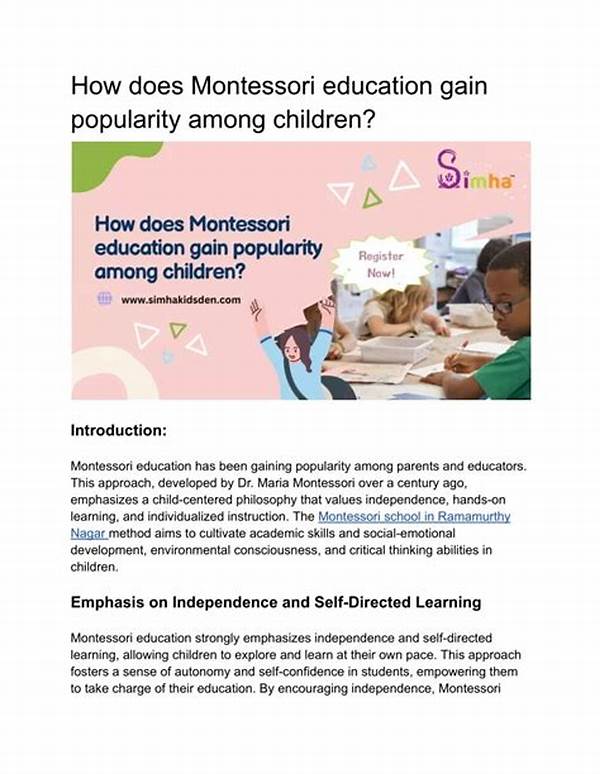Why Montessori is Gaining Popularity Among Parents
In recent years, an educational movement has taken center stage, captivating the hearts of parents across the globe. We’re talking about the Montessori method—a revolution in how we think about childhood development and education. Designed to foster independent learning and creative thinking, Montessori schools are mushrooming in urban and suburban areas alike. But what is the secret ingredient that has led to this surge in popularity? Why are parents willing to invest hefty sums for their children to be part of this educational approach? Let’s embark on a journey through the multifaceted universe of the Montessori method to uncover why Montessori is gaining popularity among parents.
Read More : Montessori Adalah
Originally developed by Maria Montessori in the early 20th century, the Montessori method emphasizes independence, freedom within limits, and respect for a child’s natural psychological development. It’s not just a method; it’s an ethos, a way of life that lives by one simple yet profound rule: children have an innate ability to direct their own learning if only given the right environment. Imagine a classroom without traditional desks, devoid of the bell’s incessant ringing, and a cacophony of sounds that serves not as noise, but as a symphony of discovery. Yes, this is the Montessori classroom, a playground of minds, where curiosity reigns supreme.
One testimonial from a parent, Anna, perfectly encapsulates this: “The moment I walked into that Montessori classroom was the moment I realized the kind of educational experience I wanted for my child. It’s a haven of creativity and self-discovery.” Such glowing testimonials are not rare, but rather the norm, adding layers of emotional appeal to an already compelling argument. In a world driven by measurable results, the Montessori method offers something uniquely humane—development through understanding and collaboration rather than competition.
What Makes Montessori So Attractive?
In our fast-paced, high-demand society, parents are seeking an educational framework that offers not only academic excellence but also emotional and social skills—skills that are increasingly seen as the bedrock for a well-rounded individual. The Montessori method feeds into this demand, making it an ever more appealing choice for modern parents. From fostering individual choice and responsibility to cultivating an international mindset, Montessori offers a curriculum decidedly in tune with contemporary values.
As more studies emerge highlighting the long-term benefits of Montessori education—ranging from improved social interactions to superior academic performance—it becomes increasingly difficult for parents to ignore its allure. A landmark study published in Science magazine highlighted that Montessori students outperformed their peers in standardized tests, emotional maturity, and social adeptness. It’s not just educational chatter; it’s scientifically endorsed truth. So why is Montessori gaining popularity among parents? Because it delivers on the promise of nurturing engaged, capable, and compassionate adults.
How Montessori Promotes Independent Learning
It’s one thing to talk about Montessori’s values, but how are they manifested in the classroom to nurture self-directed learning? Picture a setting where children choose their activities from an array of possibilities, learning through exploration and interaction. Teachers, or rather guides, facilitate rather than instruct, offering resources for children to make their own discoveries. The classroom becomes a microcosm of society, complete with the responsibilities and freedoms found in adulthood.
What truly captures the essence of a Montessori education is its adaptability and relevance. In many ways, Montessori classrooms function like a meticulously designed lab experiment—they set up the conditions for learning, letting children’s natural curiosity guide the process. And with the buzzwords of today’s educational field centering around choice, personalized learning, and student agency, it’s no wonder that the Montessori method aligns perfectly with the needs and desires of 21st-century education.
—
Discussion Topics on Why Montessori is Gaining Popularity Among Parents
How Parents Can Make the Most Out of Montessori Education
Making the decision to enroll your child in a Montessori school is one step, but how can parents actively engage in their child’s Montessori education to maximize its benefits? To truly reap the rewards, understand that the Montessori method extends beyond the classroom walls. For a child’s growth to be consistent and harmonious, it’s crucial that parents embody its principles at home as well.
An open dialogue with Montessori guides can offer parents insights into replicating mindsets at home. Encouraging self-discipline, offering choices, and nurturing curiosity at home can amplify classroom learning. For instance, set up a family library or a creative corner that allows your child the freedom to explore subjects beyond their structured learning environment. Share in their excitement, ask open-ended questions, and engage in activities that challenge their problem-solving abilities.
Creating a Montessori-Friendly Home Environment
By crafting a nurturing and exploratory environment at home, you strengthen the bridge between school and home life. When children find these values mirrored in their home, they come to internalize them, turning a methodology into a lived, lasting perspective. Considerations like well-organized spaces, accessible resources, and fostering independence are not exclusive to the Montessori school but applicable to every facet of a child’s world.
In conclusion, why Montessori is gaining popularity among parents isn’t a mystery; it’s the fulfillment of a promise—a promise of nurturing whole, capable, and conscientious human beings. The Montessori method allows for tailoring education to meet the child’s needs of today while preparing them for the demands and challenges of tomorrow. Embracing it, both in and out of the classroom, is an investment not just in education but in the very future of learning itself.
Tips for Embracing the Montessori Method at Home
In embracing these home practices, parents offer their children the best chance at internalizing the philosophy of Montessori, enhancing the experiences they gain from their educational environment. The Montessori method, in its core, resonates deeply with those desiring an educational shift – one towards empathy, respect, and independent growth, making it a genuinely popular choice among discerning parents.
